Related Research Articles

"Sir Duke" is a song composed and performed by Stevie Wonder from his 1976 album Songs in the Key of Life. Released as a single in 1977, the track topped the U.S. Billboard Hot 100 and Black Singles charts, and reached number two in the UK Singles Chart, his joint biggest hit there at the time. Billboard ranked it as the No. 18 song of 1977.

"I Can't Stop Loving You" is a popular song written and composed by country singer, songwriter, and musician Don Gibson, who first recorded it on December 3, 1957, for RCA Victor Records. It was released in 1958 as the B-side of "Oh, Lonesome Me", becoming a double-sided country hit single. At the time of Gibson's death in 2003, the song had been recorded by more than 700 artists, most notably by Ray Charles, whose recording reached No. 1 on the Billboard chart.

"The First Cut Is the Deepest" is a 1967 song written by British singer-songwriter Cat Stevens, originally released by P. P. Arnold in April 1967. Stevens's own version originally appeared on his album New Masters in December 1967.
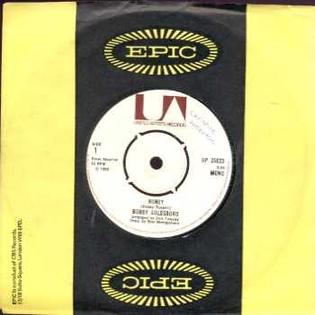
"Honey", also known as "Honey (I Miss You)", is a song written by Bobby Russell. He first produced it with former Kingston Trio member Bob Shane, who was the first to release the song. It was then given to American singer Bobby Goldsboro, who recorded it for his 1968 album of the same name, originally titled Pledge of Love. Goldsboro's version was a hit, reaching No. 1 in several countries.
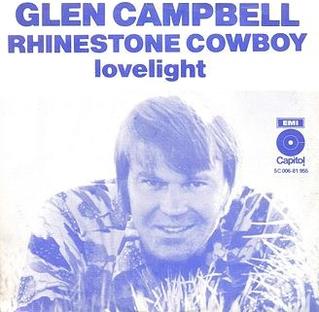
"Rhinestone Cowboy" is a song written and recorded by Larry Weiss in 1974, then popularized the next year by American country music singer Glen Campbell. When released on May 26, 1975, as the lead single and title track from his album Rhinestone Cowboy, it enjoyed huge popularity with both country and pop audiences.
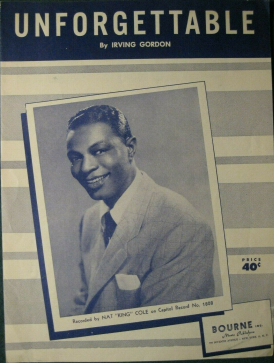
"Unforgettable" is a popular song written by Irving Gordon. The song's original working title was "Uncomparable,” however, the music publishing company asked Gordon to change it to "Unforgettable.” The song was published in 1951.

"Tell It Like It Is" is a song written by George Davis and Lee Diamond and originally recorded and released in 1966 by Aaron Neville. In 2010, the song was ranked No. 391 on Rolling Stone magazine's list of The 500 Greatest Songs of All Time.
"By the Time I Get to Phoenix" is a song written by Jimmy Webb. Originally recorded by Johnny Rivers in 1965, it was reinterpreted by American country music singer Glen Campbell on his album of the same name. Released on Capitol Records in 1967, Campbell's version topped RPM's Canada Country Tracks, reached number two on Billboard's Hot Country Singles chart, and won two awards at the 10th Annual Grammys. Broadcast Music, Inc. (BMI) named it the third most performed song from 1940 to 1990. The song was ranked number 20 on BMI's Top 100 Songs of the Century. Frank Sinatra called it "the greatest torch song ever written." It was No. 450 on Rolling Stone magazine's Top 500 Songs of All Time.
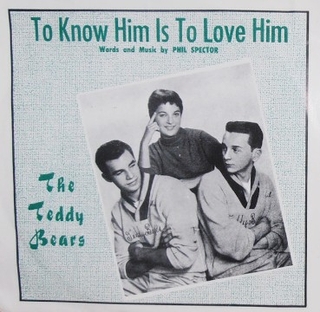
"To Know Him Is to Love Him" is a song written by Phil Spector, inspired by the words on his father's gravestone, "To Know Him Was to Love Him". It was first recorded by the only vocal group of which he was a member, The Teddy Bears. The single spent three weeks at No. 1 on the Billboard Hot 100 chart in 1958, while reaching No. 2 on the UK's New Musical Express chart. Peter & Gordon and Bobby Vinton later each experienced chart success with the song, in 1965 and 1968, respectively.
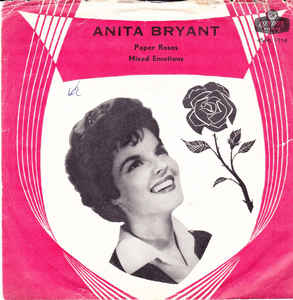
"Paper Roses" is a popular song written and composed by Fred Spielman and Janice Torre. It first was a top five hit in 1960 for Anita Bryant. Marie Osmond recorded it in 1973 and took her version to number one on the US country chart.

"Before the Next Teardrop Falls" is an American country and pop song written by Vivian Keith and Ben Peters, and most famously recorded by Freddy Fender. His version was a major crossover success in 1975, reaching number 1 on the Billboard pop and country charts.

"Wasted Days and Wasted Nights" is an American country and pop song recorded by Freddy Fender. It is considered by many to belong to the swamp pop idiom of south Louisiana and southeast Texas that had such a major musical impact on Fender.
"Share Your Love with Me" is a song written by Alfred Braggs and Deadric Malone. It was originally recorded by blues singer Bobby "Blue" Bland. Over the years, the song has been covered by various artists, most notably Aretha Franklin who won a Grammy Award for her 1969 rendition. Other artists who covered the song include The Band in 1973, Kenny Rogers in 1981, and most recently, Van Morrison in 2016.

"If You Love Me (Let Me Know)" is a song written by John Rostill that was a 1974 hit single for Olivia Newton-John. It was her second release to hit the top 10 in the United States, reaching number 5 on the pop chart and number 2 on the Easy Listening chart. It also reached number 2 on the Billboard country chart. As with her single "Let Me Be There", Mike Sammes sings a bass harmony. It was nominated for the 1974 Country Music Association Award for Single of the Year.
"The Race Is On" is a song written by Don Rollins and made a hit on the country music charts by George Jones and on the pop and easy listening charts by the unrelated Jack Jones. George's version was the first single released from his 1965 album of the same name. Released as a single in September 1964, it peaked at number three on the Billboard Hot Country Singles chart and at number 96 on the Billboard Hot 100 in January 1965. Jack's version topped Billboard's Easy Listening chart and reached number 15 on the Hot 100 the same year. The two recordings combined to reach number 12 on the Cashbox charts, which combined all covers of the same song in one listing and thus gave George Jones his only top-40 hit. The song uses thoroughbred horse racing as the metaphor for the singer's romantic relationships.

"Then You Can Tell Me Goodbye" is a song written by John D. Loudermilk. It was first released in 1962 by Don Cherry, as a country song and again as a doo-wop in 1967 by the group The Casinos on its album of the same name, and was a number 6 pop hit that year. The song has since been covered by Eddy Arnold, whose version was a number 1 country hit in 1968, and by Neal McCoy, whose version became a Top 5 country hit in 1996.

"Can't You See" is a song written by Toy Caldwell of The Marshall Tucker Band. The song was originally recorded by the band on their 1973 debut album, The Marshall Tucker Band, and released as the album's first single. Record World called it "a strong rhythm item that continually builds and builds." A live version was released in 1977 and peaked at number 75 on the Billboard Hot 100. Cover versions of "Can't You See" have charted for Waylon Jennings and the Zac Brown Band with Kid Rock (2010).
"Please Talk to My Heart" is a single by American country music artist Johnny "Country" Mathis. It was released in 1963, and peaked at number 14 on the Billboard Hot Country Singles chart. The song was written by Jimmy Lee Fautheree and Johnny Mathis.
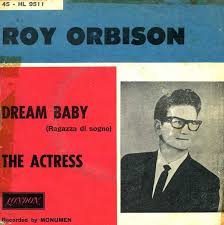
"Dream Baby (How Long Must I Dream)" is a song written by Cindy Walker which was first recorded and released by Roy Orbison originally as a non-album single in 1962. It was a big international hit for Orbison, reaching number 2 in both the Australian and the UK singles charts and number 4 in the U.S. Billboard. It was also a top ten hit in Canada and Norway. Five months later, "Dream Baby" was included on Orbison's Greatest Hits compilation LP.
"Just One Time" is a single written and originally recorded by American country music artist Don Gibson. Released in February 1960, the song reached #2 on the Billboard Hot Country Singles chart, while also reaching #29 on the Billboard Pop chart. The single was later released on Gibson's album Look Who's Blue.
References
- ↑ "Spotlight Singles". Billboard: 18. December 11, 1965.
- ↑ Wood, Roger; Cano, Ray (May 27, 2015). "SugarHill Recording Studios". Texas State Historical Association. Retrieved 19 August 2024.
- ↑ "Freddy Fender singles". Allmusic . Retrieved March 16, 2011.
- ↑ "RPM Country Singles for June 4, 1977". RPM . Retrieved March 16, 2011.
- ↑ "Big Sambo Chart History (Hot 100)". Billboard.
- ↑ "Sir Douglas Quintet Chart History (Hot 100)". Billboard.
- ↑ "Top RPM Singles: Issue 5751." RPM . Library and Archives Canada.
- ↑ "Freddy Fender Chart History (Hot Country Songs)". Billboard.
- ↑ "Hot Country Songs – Year-End 1977". Billboard. Retrieved July 20, 2021.